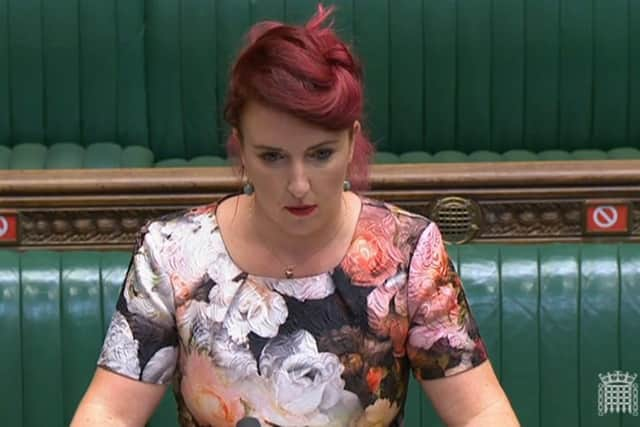Ben Lowry: The double jobbing u-turn leaves the DUP with reduced options at Stormont


(See below for link to last week’s column)
The announcement made on Friday night eight days ago seemed designed to help the DUP in its effort to get the party leader Sir Jeffrey Donaldson back to Stormont, without forcing an immediate by-election for his Lagan Valley MP vacancy, that the party might lose.
But while the proposal made pundits, including me, wonder if it was part of a DUP-Conservative deal it also reflected wider thinking in the House of Commons – the former Labour Northern Ireland spokesperson, for example, Louise Haigh last year spoke in favour of reform to double jobbing rules.
Advertisement
Hide AdAdvertisement
Hide AdMy understanding is that there was no wider agreement between the Tories and Sir Jeffrey, who put a brave face this week on the u-turn.
It puts him in a tricky situation after he becomes a Stormont MLA.
First there will be a Westminster by-election in Lagan Valley, where the DUP majority in 2019 was slashed from, in 2017, a colossal 19,000 votes over the next nearest rival (an Ulster Unionist) to a still clear but uncomfortably reduced majority of 6,000 over Alliance.
But it also greatly undermines a key point of leverage for Sir Jeffrey.
Advertisement
Hide AdAdvertisement
Hide AdOwen Polley on page 15 (see link below) writes about how the DUP pledge to end this term of Stormont and force an election in the absence of reform to the NI Protocol has now been rendered almost meaningless by delays in London’s deadline for an EU deal.
The DUP did however have another card: it could have taken advantage of emerging legislation to make Stormont more stable, which would allow an increased six month period after May’s elections before an executive must be formed. The party could have stalled on agreeing to such a formation if it didn’t have a result on the Irish Sea border.
But if Sir Jeffrey will be without a Westminster seat then he will be known to be in the same situation Arlene Foster found herself after 2017 – effectively jobless unless Stormont is operating as normal.
Thus the u-turn by Boris Johnson this week leaves the DUP with badly reduced options. The party also looks isolated amid the joint six-party approach to Mr Johnson against the double jobbing plan.
Advertisement
Hide AdAdvertisement
Hide AdThis must all be a joy for Sinn Fein. On one issue or another they have found themselves joined by almost all of the parties as signatories in petitions to power against various topics of the day.
They enjoyed multi-party photo opportunities for their demand for an Irish language act, yet I never recall a single multi-party approach to London or Dublin calling on the two governments to ensure that SF’s collapse of Stormont in 2017 did not get political reward (in the end it of course got reward, not only acceptance of the principle that there could be no return to devolution without a language act, but later special arrangements when a Tory government, facilitated by the DUP under Edwin Poots, agreed to legislate to prioritise that act).
Sinn Fein enjoyed four-party approaches to the EU both before the NI Protocol was agreed, and after (demanding its implementation).
On double jobbing it finds itself alongside the Ulster Unionist Party in its joint approach to Downing St.
Advertisement
Hide AdAdvertisement
Hide AdAnd there was a notable moment last year when Paul Givan observed that SF was, like the other parties, opposed to the government legacy plan, and he said the party could influence such debates by taking its Westminster seats. This gave a sense of common purpose, which was unfortunate given that the republican role in the Troubles is at the core of unionist dislike of SF.
You might expect that on legacy, above all issues, unionists would express contempt for the republican stance on an amnesty, and emphasise that their rejection of the proposed stay on prosecutions is for reasons opposite to those of SF.
But whatever mis-steps unionists make, it is only fair to note that they get little consistent, heavyweight support at Westminster.
Every so often this paper is alerted to a sympathetic question that a pro unionist peer has asked in the Lords, soliciting a seemingly unionist answer from a minister. But this is no match for Tory MPs such as Julian Smith and Simon Hoare, the influential NI Affairs Committee chair, who speak up as soon as Ireland is upset about something.
Advertisement
Hide AdAdvertisement
Hide AdHoare, an MP who is swift to dismiss unionist concerns (often rolling his eyes at criticisms of the protocol), this week led the Commons chorus against the double jobbing move. The government soon buckled to his arguments.
• Ben Lowry (@BenLowry2) is News Letter editor
• Ben Lowry: My memory of 1985 Meat Loaf concert in Belfast
• Ben Lowry January 15: Double jobbing change seems to be bid by London to shore up the DUP